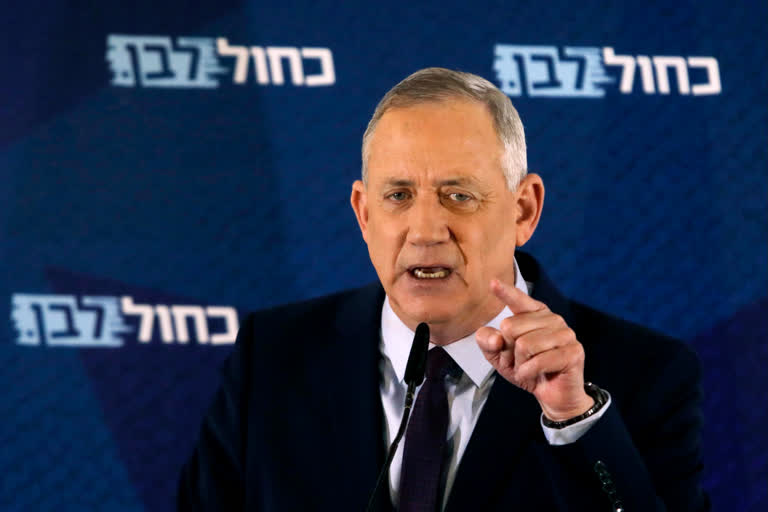Jerusalem: Israeli opposition leader Benny Gantz will be given the first opportunity to form a new government after an inconclusive national election this month, the country’s president said Sunday, raising questions about Prime Minister Benjamin Netanyahu’s political future.
The decision by President Reuven Rivlin was announced by his office after he consulted with leaders of all of the parties elected to parliament. He will formally designate Gantz with the task on Monday and give him a month to cobble together a governing coalition.
The political wrangling comes at a sensitive time. Netanyahu has been leading the country as it confronts a growing coronavirus threat, with over 200 cases diagnosed and the number quickly rising. Netanyahu also faces serious legal troubles as he prepares to go on trial to face corruption charges.
Netanyahu's Likud emerged as the largest party in the March 2 election, Israel's third in under a year. But with his smaller religious and nationalist allies, he received the support of only 58 lawmakers during Sunday's consultations, leaving his right-wing bloc three seats short of the required majority in parliament.
Gantz's Blue and White received the support of parties representing 61 seats, a slim majority. However, those parties are also divided, and it is not clear whether Gantz will succeed in putting together a coalition. One lawmaker refused to endorse either side.
Given the likelihood of continued deadlock, Rivlin late Sunday summoned both Netanyahu and Gantz to an emergency meeting, where the men pledged to explore a unity government.
In a joint statement, both parties thanked Rivlin and said their leaders “agreed for the respective negotiation teams to meet soon.”
Rivlin had earlier called for a power-sharing unity government to lead the country through its many crises. Israel has gone through three inconclusive elections in the past year, leaving it with a caretaker government as it confronts a host of challenges, including the coronavirus battle. If the two rivals cannot reach a unity deal, the country could find itself in a fourth consecutive election campaign.
“Anyone who has watched the news in recent days understands that this is a time of trial and that these are not regular consultations,” Rivlin said earlier Sunday. “We must now deal with forming a government as soon as possible ... at this complex time.”
Read more:Netanyahu urges Israelis to adopt 'Namaste' to greet
Israel government:
Rivlin's duties are largely ceremonial. But he is responsible for designating the candidate he thinks has the best chance of forming a government by securing a parliamentary majority.
That usually goes to the leader of the largest party, in this case, Netanyahu. But after a slim majority endorsed Gantz on Sunday, Rivlin appeared to have little choice.
Gantz will face a difficult task securing a governing coalition.
The parties that endorsed him have little in common beyond their shared antipathy toward Netanyahu, who has led the country for the past 11 years. They include the predominantly Arab Joint List and the ultra-nationalist Yisrael Beitenu.
Yisrael Beitenu's leader, Avigdor Lieberman, and two members of Gantz's own Blue and White party have said they would oppose a government that relies on support from the Joint List. Lieberman told the president that he supports Gantz, but also called for the formation of an “emergency” unity government to deal with the coronavirus threat.
